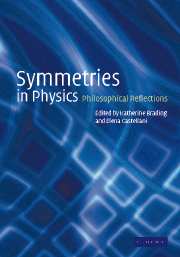Book contents
- Frontmatter
- Contents
- List of contributors
- Preface
- Copyright acknowledgements
- 1 Introduction
- Part I Continuous symmetries
- 2 Classic texts: extracts from Weyl and Wigner
- 3 On continuous symmetries and the foundations of modern physics
- 4 The philosophical roots of the gauge principle: Weyl and transcendental phenomenological idealism
- 5 Symmetries and Noether's theorems
- 6 General covariance, gauge theories, and the Kretschmann objection
- 7 The interpretation of gauge symmetry
- 8 Tracking down gauge: an ode to the constrained Hamiltonian formalism
- 9 Time-dependent symmetries: the link between gauge symmetries and indeterminism
- 10 A fourth way to the Aharonov–Bohm effect
- Part II Discrete symmetries
- Part III Symmetry breaking
- Part IV General interpretative issues
- Index
9 - Time-dependent symmetries: the link between gauge symmetries and indeterminism
Published online by Cambridge University Press: 08 October 2009
- Frontmatter
- Contents
- List of contributors
- Preface
- Copyright acknowledgements
- 1 Introduction
- Part I Continuous symmetries
- 2 Classic texts: extracts from Weyl and Wigner
- 3 On continuous symmetries and the foundations of modern physics
- 4 The philosophical roots of the gauge principle: Weyl and transcendental phenomenological idealism
- 5 Symmetries and Noether's theorems
- 6 General covariance, gauge theories, and the Kretschmann objection
- 7 The interpretation of gauge symmetry
- 8 Tracking down gauge: an ode to the constrained Hamiltonian formalism
- 9 Time-dependent symmetries: the link between gauge symmetries and indeterminism
- 10 A fourth way to the Aharonov–Bohm effect
- Part II Discrete symmetries
- Part III Symmetry breaking
- Part IV General interpretative issues
- Index
Summary
Introduction
Mathematically, gauge theories are extraordinarily rich – so rich, in fact, that it can be all too easy to lose track of the connections between results, and become lost in a mass of beautiful theorems and properties: indeterminism, constraints, Noether identities, local and global symmetries, and so on.
One purpose of this short article is to provide some sort of a guide through the mathematics, to the conceptual core of what is actually going on. Its focus is on the Lagrangian, variational-problem description of classical mechanics, from which the link between gauge symmetry and the apparent violation of determinism is easy to understand; only towards the end will the Hamiltonian description be considered.
The other purpose is to warn against adopting too unified a perspective on gauge theories. It will be argued that the meaning of gauge freedom in a theory such as general relativity is (at least from the Lagrangian viewpoint) significantly different from its meaning in theories such as electromagnetism. The Hamiltonian framework blurs this distinction, and orthodox methods of quantization obliterate it; this may, in fact, be genuine progress, but it is dangerous to be guided by mathematics into conflating two conceptually distinct notions without appreciating the physical consequences.
The price paid by this article for abandoning the mathematics of gauge theory as far as possible is an inevitable loss of rigour. Virtually nothing will be ‘proved’ below; at most, the shape of proofs will be gestured at and strong plausibility-arguments advanced.
- Type
- Chapter
- Information
- Symmetries in PhysicsPhilosophical Reflections, pp. 163 - 173Publisher: Cambridge University PressPrint publication year: 2003
- 4
- Cited by



